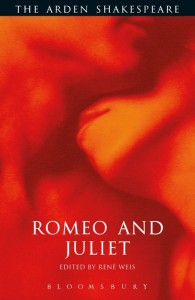By William Shakespeare. First published in Britain in 1597 by John Dexter (Q1), then in 1599 by Cuthburt Burby (Q2). Review copy from ‘The Arden Shakespeare: Third Series’, edited by René Weis.
This actually came out in printed format a couple of years ago, but I never reviewed it, mostly as I don’t have much to say about Romeo And Juliet as a play. It’s sort of like giving your opinion on Hamlet – I’m not sure where to begin, or if my opinion is even relevant. I’d really never gotten as attached to it as I had to, say, Measure for Measure or Troilus and Cressida, though I can recognize its greatness. However, it coincidentally happened to be the first Arden Shakespeare release to come out as an ebook – I got mine on Kindle via Amazon – and so I thought I’d take a look, seeing what the ebook version can give to me, and also reassessing the play.
I generally prefer Shakespeare’s comedies to his tragedies, so it helps that this one is structured very much like a comedy till the deaths start happening, with lots of back and forth between servants and comedic sexual banter from Mercutio. But where in Much Ado the characters might get a bit angry at times, here almost everyone is constantly on edge – the first scene has the two families come to blows pretty much because they walk past each other – and therefore even comedic situations can ignite a spark. This is not helped by Mercutio (again), who practically goads Tybalt into killing him. Mercutio is much beloved as a character, mostly as he’s a more ‘modern’, with it guy compared to soppy Romeo and raging Tybalt, but he’s just as bad at keeping his temper and not doing dumb things.
And so tragedy does happen, as the crazy scheme to feign Juliet’s death till Romeo can come spirit her away goes soup. Juliet is one of the great female characters created by Shakespeare (which yes, was created for a young boy to perform), and it’s not just to avoid scandal that the actresses are usually much older than the ‘about to turn 14’ Juliet is. The audience is willing to suspend disbelief in order to see a truly stellar piece of acting, and Juliet gives a lot of fuel to burn there. Not to sell Romeo short – he starts off as a callow youth going through the motions of being lovestruck, but the way Shakespeare changes his vocabulary once he meets Juliet is one of the best parts of the play.
I actually found it easier to read this as an ebook – the printed version has the annotations (telling you what this Elizabethan term meant, etc.) on the bottom of the page, but your eyes still bounce up and down constantly as you track when the next note is. With the ebook you can tap to the endnote, then tap right back, making it flow better. The endnotes and annotations are positioned well – some ebooks have issues with endnotes, meaning you have to wait 30 seconds for the book to ‘catch up’ to you before you can return to the text, but not here. The only issue I had was with the facsimile of Q1 being too small to read on my phone, but larger ebook devices shouldn’t have that problem.
The scholarship here is good – Weis’ introduction is informative without overstaying its welcome, and the text fuses together Q1 and Q2 in ways that make sense (and are explained throughout), making this a very readable Romeo And Juliet. I suspect it was chosen to debut the ebook editions simply as it was one of the more recent books – formatting books like these doesn’t come quickly – and would not be surprised if Coriolanus, which came out in 2013, is the next one we see. In any case, those looking to dip their toes into Critical Editions of Shakespeare’s plays or just wanting a good readable ebook Romeo and Juliet should greatly enjoy this edition.



